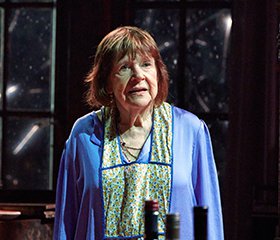“I know that I’m considered a comedic character actress,” Marylouise Burke told me the other day. “Even though a lot of my work has combined comedy with seriousness.” That’s certainly the case with Morkan, the central role in Epiphany for which Burke has been widely acclaimed.
Burke, who was born in Steelton, Pennsylvania, acknowledged that Morkan gives her a chance “to display all my comic plumage.” The character, who has assembled nine people for an old-fashioned dinner party, “flits about at first trying to make sure everyone is comfortable. It’s an occasion for a great deal of merriment.”
Once the party sits down to tuck into their meal of goose and all the trimmings, however, Burke pointed out “that things turn more serious and reflective. Morkan has a couple of big moments in which we see that she’s a wounded creature. She may have cooked her own goose – as well as the one she serves her guests.”
The first big moment involves the guests’ inability to go along with instructions they had been emailed about the dinner. “One of the reasons that Morkan has gotten these people together,” Burke said, “is that she wanted to create a tradition around what Epiphany is. But she finds that creating a tradition is a lot harder than she imagined.”
The second big moment involves a secret that Morkan reveals late in the play. “Throughout the evening, she’s been sitting on this information that she is going to share. She’s felt an enormous amount of guilt for some time about that secret. As an actress, I’ve chosen to think she has not been directly responsible” for the event at the center of that secret.
Also late in the play: Morkan admits that she feels unhinged. She is getting older, and her day-to-day circumstances have changed, and the need to adjust has undone her. “Audiences have been remarkably willing to go along with this aspect of Morkan emotionally,” Burke said. “After one of the early previews, a group of ladies of a certain age came up to me and confessed, ‘That’s exactly where we are right now in our lives.’”
Morkan isn’t the first character who has allowed Burke to touch audiences so deeply. Similarly resonant have been the roles for which she is perhaps best known to New York theatergoers – Gertie in David Lindsay-Abaire’s 1999 play Fuddy Mears and the title role in the same writer’s Kimberly Akimbo. The latter has been turned into a musical which premiered last season off-Broadway and, garlanded with awards, is headed for Broadway. Burke said that when her longtime friend Lindsay-Abaire mentioned that the play was being turned into a musical she was a little surprised. Then she saw it. “As soon as it began I was transported. I learned new things about the character.”
As for Morkan, Burke said that over the course of the run of Epiphany, which concludes this weekend, she’s learned a few things about Morkan. One of them: “Even though she lives quite close to a major city she has not led a metropolitan life. Yet she has maintained an awareness of and an interest in cultural things.”
Another: “It’s become clearer and clearer to me why Morkan has lost her compass – the lodestar that has been guiding her for years.” She added: “She’s living all by herself in a big house. She’s alone with her thoughts and feelings.”
Negotiating all the twists and turns of Morkan has, Burke said, “been both exhausting and satisfying. I enjoy playing her and am helped enormously by having such a tremendous company of actors to interact with. I can’t imagine how I’d get through the play every night without people of this caliber. Honestly, it’s not something I’d like to contemplate!”
Brendan Lemon is the editor of lemonwade.com
